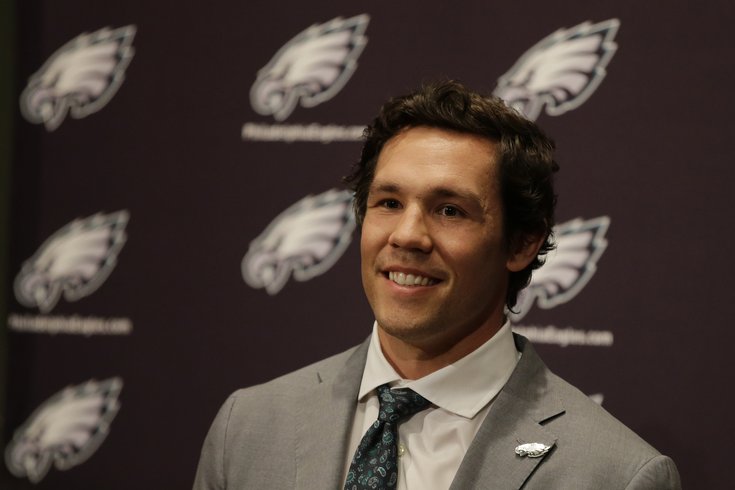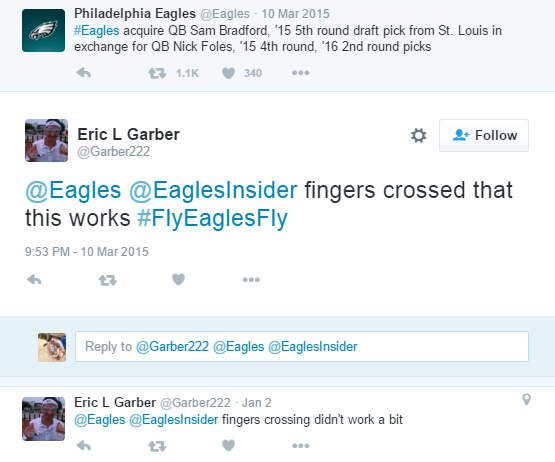
February 16, 2016
 Matt Slocum/AP
Matt Slocum/AP
Even if Sam Bradford had a great 2015 season, retaining him would raise serious questions.
March 10, 2015 is a day that could live in Eagles Twitter infamy. That was of course the day that Chip Kelly traded Nick Foles, a second round pick in 2016, and a fourth round pick in 2015 to the Rams for Sam Bradford and a fifth round pick in 2015. The Eagles tweeted the announcement like so:
#Eagles acquire QB Sam Bradford, '15 5th round draft pick from St. Louis in exchange for QB Nick Foles, '15 4th round, '16 2nd round picks
— Philadelphia Eagles (@Eagles) March 10, 2015
If you open up that tweet (you can click here for the expanded view), you can see the fans' reaction. I clicked "see more" as many times as I could to view as many reactions as possible. By my count, there were 256 replies. Only two people reacted positively. One of them was this guy, who uses the word "neat."
@Eagles neat. i like bradford
— BoBnfishy (@BoBnfishy) March 11, 2015
• The "f word" was used 16 times in replies to the Eagles' announcement. You could go ahead and double that total if you were to include abbreviations for the "f word" like "wtf," or the "f word" appearing in memes, or someone training their parrot to use the "f word."
• Two people legitimately thought the Eagles typed it wrong, and were looking for a further explanation.
• Eight people said that they were either switching allegiances to another team, or they were simply "out" on the Eagles.
• Surprisingly, only four people made reference to Bradford's injury history. That would come later, I suppose.
• Nine people wondered if it was a joke.
• My favorite response, by far, was the guy below, who appeared to not be sold on the idea, but was crossing his fingers that it would all work out. He returned to his tweet in January to note that his "fingers crossing" didn't work. Check out the dates below:

Oftentimes, our instant reactions (or overreactions) to breaking news can be wrong. However, more often than, when news is so overwhelmingly received the same way, the masses are typically correct.
The trade for Sam Bradford was always dumb. The Eagles were trading major resources (draft picks, a starting QB who at the time still had some value, and a lot of money) for a player who had never produced in the NFL and had a long list of serious injuries. On top of that, the Eagles would only control his rights for one year. At the time, there were three basic outcomes:
1) Bradford would be bad or get injured: In this scenario, he'd just be gone and the Eagles would take a loss on everything they invested in him.
2) Bradford would be good: This, of course, was the best case scenario. Unfortunately, even in the best case scenario, there was a significant downside. If Bradford played like, say, the fifth to tenth best quarterback in the NFL, won the division, and maybe a playoff game, the Eagles would likely be looking at paying an injury-prone quarterback with just one good year to his credit somewhere in the vicinity of $25-30 million per season.
3) Bradford would be average: This is of course where the Eagles are with Bradford now, who was awful the first half of the season, and put up empty stats in the second half. Do they tag him? Do they just let him walk? Do they sign him to a long-term deal to a cost incommensurate with his production?
Two of the above outcomes were bad at the time, and the one good outcome came with its own thick layer of questions. The trade didn't make sense then, and it sure as hell doesn't make sense now.
The Eagles used to be the fleecers in quarterback deals. Under Chip Kelly, they were the fleecees.
Follow Jimmy on Twitter: @JimmyKempski
Add some PhillyVoice RSS feeds.